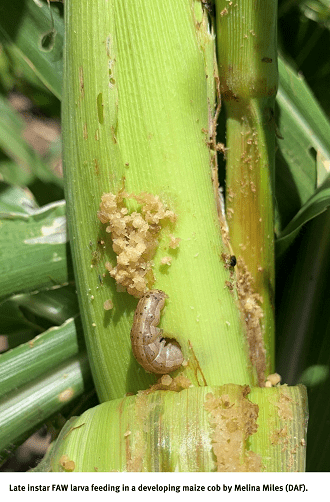FALL armyworm (Spodoptera frugiperda) has been detected in several new locations in southern and south western Queensland over the past week, at the Lockyer Valley, St George and Chinchilla.
This follows the recent detection of fall armyworm in northern New South Wales at Moree and Boggabilla near the Queensland border (see Grain Central story).
 This expansion of range from northern and central Queensland is not unexpected as fall armyworm is highly mobile, with long-distance migrations facilitated by favourable meteorological conditions.
This expansion of range from northern and central Queensland is not unexpected as fall armyworm is highly mobile, with long-distance migrations facilitated by favourable meteorological conditions.
Fall armyworm was initially detected on the Torres Strait islands of Saibai and Erub in January 2020.
Since then it has also been reported from numerous sites in northern and central Queensland including Bamaga, Croydon, South Johnstone, Tolga, Lakeland, the Burdekin, Bowen, Bundaberg, Emerald, Richmond, Clermont, Biloela, Mackay and Longreach.
Fall armyworm has also been detected in the Northern Territory and northern Western Australia.
Queensland Department of Agriculture and Fisheries principal entomologist, Dr Melina Miles, said early detection and communication within the agriculture community were essential to help battle this latest challenge for growers.
“The risk in northern NSW and Central Queensland, in places like Emerald and the Darling Downs is real and growers there need to be on high alert,” Dr Miles said.
“Given FAW was recently detected in the several parts of Southern Queensland, growers should be watching both the level of activity in local traps and closely monitoring the vegetative state of their crops.
“They can work with their entomologist to identify the signs that FAW are active and to distinguish them from native armyworms.
“For sorghum growers it is important that they inspect the crops during that vegetative stage and not just from head emergence, particularly if traps are indicating that FAW are active either North or West of you.
FAWs, native to the tropical and subtropical regions of the Americas, are attracted to maize, sweet corn, popcorn, and pose a threat throughout the growing cycle.
“We’ve not previously seen a pest that can reduce the amount of functioning leaf area to the point where it warrants control in the vegetative stage, and that is what FAW is doing – particularly in maize and sweet corn,” Dr Miles said.
“In the Burdekin, growers tell you that every crop of maize or sorghum they have has been affected to some extent.”
Seed provider, Pacific Seeds, has been working with the QDAF to develop solutions to combat the FAW, including providing seeds for seed treatment trials, working on an integrated pest management strategy, and simulating damage at varying crop stages to assist in refining the timing of control measures.
Pacific Seeds summer grains agronomist Trevor Philp said farmers needed to be aware of the risks.
“The spread of this pest could have unknown consequences for what promises to be a strong growing season, with a La Niña event driving potentially good rainfall across Australia,” Mr Philp said.
“That’s why we are working closely with the department to help give growers the tools to manage this invasive pest.
“Currently we’re simulating FAW damage on corn to see when growers should be intervening to avoid detrimental damage.
“This is because FAW damage can look worse than it is, and we don’t want growers intervening with pesticides until it’s necessary to do so.”
In conjunction with industry, DAF now manages a statewide network of over 50 pheromone traps, monitoring local fall armyworm activity–an early warning system for growers and agronomists. This trap data is updated weekly and is available on the Beatsheet website.
Source: QDAF, Pacific Seeds
Producers who think that they may have come across fall armyworm are strongly encouraged to photograph and report suspect sightings to DAF on 13 25 23 or to their local biosecurity officer or extension officer.
For more information, including the potential impacts of this pest and management advice for key crops, visit business.qld.gov.au/fallarmyworm
Grain Central: Get our free cropping news straight to your inbox – Click here

HAVE YOUR SAY